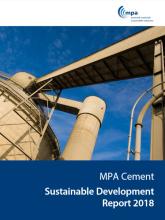The MPA Cement report states that following a stable market in the early and mid-2000s, the economic recession saw domestic cement production drop by 40% between 2007 and 2009. Since 2012, markets have improved but production is still 27% lower than in 2007. Delivering further environmental improvements is said in the report to be getting harder with rising production costs, uncertainty in the market outlook and lack of clarity on carbon and energy policy particularly on emissions trading.
Pal Chana, MPA’s executive director welcomed the report, saying: “This new report illustrates the full material flow of UK cement manufacture and the fantastic contribution that the industry is making to the circular economy with zero waste to landfill whilst consuming 1.6 million tonnes of waste and by-products from other sectors. However, the report highlights that one of the greatest threats to the UK cement industry currently and in the near future is the considerable cumulative cost burden from the implementation of climate change and energy related policies, which we estimate are going to increase by 40% to 2020, even with the limited discounting provided by Government. If action is not taken to protect the UK cement sector from these rising costs, imports will increase, jobs will be lost and security of supply will be threatened”.
Whilst the MPA Cement Performance Report highlights that cement manufacturing maintains its high level of environmental performance, the MPA is also concerned that policy drivers such as those incentivising the use of biomass in other sectors is increasing the competition for limited biomass resource, resulting in a market distortion with the potential to drive cement manufacture back towards coal use.






